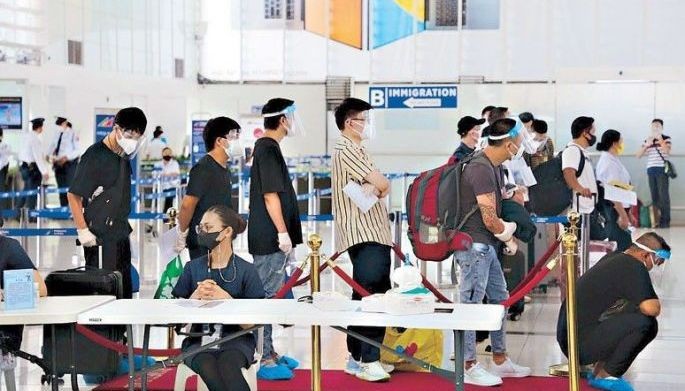MANILA, Philippines — The Philippines stands to lose about P65 billion in economic contributions should the government decide to discontinue Philippine offshore gaming operations (POGOs) in the country.
During the House of Representatives committee on labor and employment hearing yesterday, the DOF maintained that total collections from POGOs have declined over the past years.
Latest estimates from the agency showed that expected losses from POGO would be about P64.61 billion, according to Finance Undersecretary Cielo Magno.
“Should POGOs discontinue, we estimate to lose around P64.61 billion in direct economic contributions which is about 0.3 percent of our GDP (gross domestic product),” Magno said.
The country’s nominal GDP last year stood at P19.187 trillion.
Broken down, a bulk or almost 40 percent of the P64.61 billion in losses will come from housing space rentals income at P25.17 billion.
Another P16.63 billion from office space rentals will be lost.
Some P6.56 billion will be dropped from personal consumption of POGO employees and another P3.5 billion from revenues of the Philippine Amusement and Gaming Corp. (PAGCOR).
The government is also expected to lose P3.43 billion from the value-added taxes (VAT) of housing space rentals and P3.09 billion from transportation.
Other losses will stem from personal income taxes from POGO employees (P2.74 billion), VAT from office space rentals (P2.27 billion), other taxes (P830 million), corporate income tax (P340 million) and insurance (P50 million).
Magno emphasized concerns over POGO-related crimes, which can have direct effects on the country’s foreign direct investments (FDI).
“One crime incidence in every 100,000 population can result in a GDP decline of one percent,” Magno said.
“We estimate that potential losses with respect to FDIs for the Philippines will range from P16.7 billion to P26.2 billion,” she added.
The DOF official also argued about the additional cost that the government will incur for enforcers to ensure security and eliminate crimes.
POGO licensees have been slashed to 34 this year from its pre-COVID-19 level of 64 largely due to the winding down of operations due to the pandemic.
Meanwhile, the Association of Service Providers and POGOs said it would review the financial submissions of its POGO members with the PAGCOR and the Bureau of Internal Revenue (BIR) to determine compliance with their license fees and tax obligations.
This came after Sen. Sherwin Gatchalian claimed that even legitimate POGOs are remiss in paying correct taxes.
Gatchalian estimated a tax leakage of P1.9 billion due to the discrepancy of gross gaming revenue as reported by the BIR and PAGCOR from POGOs from January to August this year.
Chinese deported
In a related development, the Bureau of Immigration (BI) started deporting six Chinese nationals working in illegal POGOs in the country.
The BI identified the deportees as Yu Min, 36; Nie Zhengbiao, 31; Gan Xueliang, 29; Xu Yuanggang, 25; Qian Jie, 33, and Yang Bin, 23.
They were escorted by authorities from their detention facility to their designated airport terminal.
Justice Secretary Jesus Crispin Remulla, along with Immigration Commissioner Norman Tansingco, witnessed the deportation at the Ninoy Aquino International Airport Terminal 2 yesterday morning on board Philippine Airlines flight PR 316 bound for Wuhan, China.
Remulla said some “400 more” Chinese POGO workers in custody would also be deported.
“The Bureau of Immigration has canceled the visas of many working at the illegal POGO outlets. The work is ongoing right now,” he added.
The Department of Justice (DOJ) earlier reported that the BI had canceled the visas of 1,424 Chinese nationals working in illegal POGO outlets – a fraction of the estimated total of 48,782 employees who have to be sent back to China.
“It was determined by the BI, through Commissioner Norman Tansingco, that a more cost-efficient and humanitarian approach would be to cancel the visas of the said Chinese nationals,” Remulla said.
“The cancellation of alien visas would simply allow the Chinese nationals to voluntarily exit the country within a non-extendible period of 59 days,” he added.
Those who refuse to voluntarily leave the country after 59 days will be “summarily deported,” according to the DOJ chief.
Remulla also disclosed that “someone from the BI” has recommended giving amnesty to Chinese nationals working in illegal POGO outlets, but he said the process has to be studied first.
He said there is a need to consult with other government agencies on the issue of amnesty to illegal aliens.
“We have to look at this from the practical standpoint, the national standpoint and even the national security standpoint,” he added.
BI spokesperson Dana Sandoval recently said that there is an ongoing verification of 48,782 illegal Chinese workers who were affected by the closure of POGOs before they will be sent back to their country of origin for overstaying here in the Philippines. – Rudy Santos, Robertzon Ramirez, Paolo Romero, Delon Porcalla


